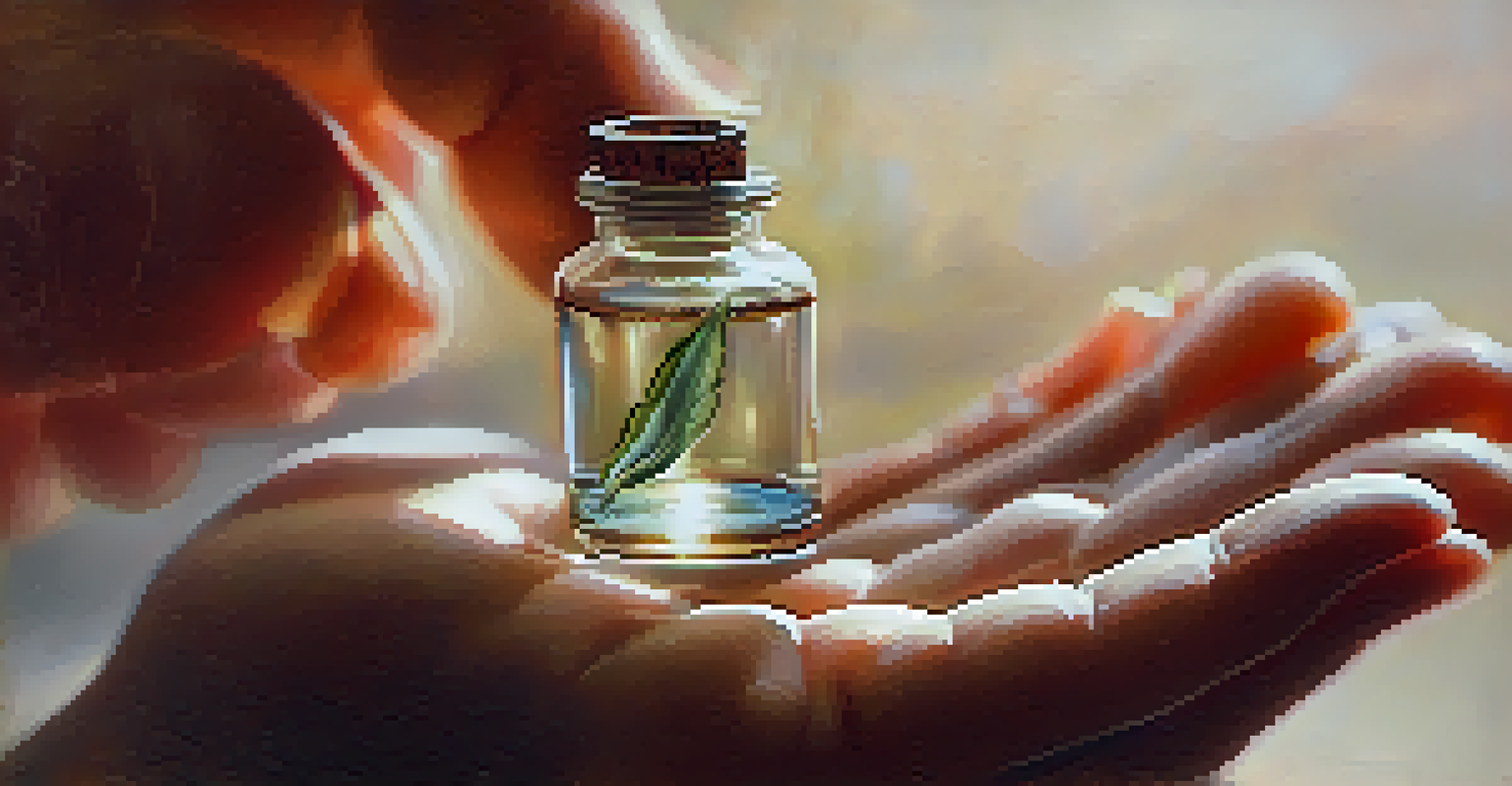Blissful Experiences: The Science Behind Entheogens

What Are Entheogens and Their Historical Use?
Entheogens are substances that are believed to facilitate spiritual experiences. Historically, cultures around the world have used these natural compounds, such as psilocybin mushrooms and peyote, in religious and healing rituals. These practices date back thousands of years, illustrating a profound human connection to altered states of consciousness.
The greatest discovery of my generation is that a human being can alter his life by altering his attitude of mind.
The term 'entheogen' itself comes from the Greek words meaning 'generating the divine within.' This highlights the intention behind their use—often aimed at fostering a deeper understanding of oneself or the universe. Many indigenous cultures view these substances as sacred, using them to connect with the spiritual realm.
In recent years, there has been a resurgence of interest in entheogens, particularly in the context of modern therapeutic practices. Researchers are now studying their potential benefits for mental health, addiction treatment, and personal growth, bridging ancient wisdom with contemporary science.
The Science of How Entheogens Affect the Brain
Entheogens work primarily by interacting with serotonin receptors in the brain, particularly the 5-HT2A receptor. This interaction leads to altered perceptions and heightened emotional experiences, creating a sense of unity and connection with the world. Understanding this mechanism can help demystify the powerful effects these substances can have on the mind.

When consumed, entheogens can increase neural connectivity, allowing different parts of the brain to communicate more freely. This can lead to enhanced creativity, introspection, and even feelings of transcendence. Many users report experiencing profound insights about their lives and relationships during these states.
Entheogens and Spiritual Connection
Entheogens are substances that facilitate spiritual experiences and have been used in various cultures for thousands of years.
Moreover, the brain's default mode network (DMN)—responsible for self-referential thoughts and the 'ego'—is significantly altered under the influence of these substances. This disruption can lead to a sense of ego dissolution, which many describe as a blissful experience, fostering personal growth and emotional healing.
Therapeutic Benefits of Entheogens in Modern Medicine
Recent studies have shown that entheogens can be beneficial in treating various mental health conditions, such as depression, anxiety, and PTSD. For instance, psilocybin therapy has demonstrated significant positive outcomes for patients who have not responded to traditional treatments. This has opened new avenues for therapeutic applications.
The mind is everything. What you think you become.
The mechanism behind these benefits often lies in the profound experiences that these substances can induce. Patients report gaining new perspectives on their issues, which can lead to lasting changes in behavior and thought patterns. This therapeutic aspect is reminiscent of a guided journey through one’s psyche.
Furthermore, clinical trials are increasingly exploring the long-term effects of entheogen use in therapeutic settings. As researchers continue to uncover the potential benefits, the stigma surrounding these substances is slowly diminishing, paving the way for more open discussions about their use in mental health treatment.
The Role of Set and Setting in Entheogenic Experiences
One of the key factors influencing the experience of entheogens is the concept of 'set and setting.' 'Set' refers to the mindset of the individual, while 'setting' encompasses the physical and social environment in which the substance is consumed. Both play a crucial role in determining the nature of the experience.
A positive mindset and a safe, comfortable environment can enhance the blissful effects of entheogens, leading to more profound insights and feelings of connection. Conversely, a negative mindset or an uncomfortable setting can result in challenging experiences, often referred to as 'bad trips.' This underscores the importance of preparation and intention.
Therapeutic Potential of Entheogens
Recent studies show that entheogens can effectively treat mental health conditions, offering new therapeutic avenues for patients.
Many practitioners emphasize the value of having a supportive guide or facilitator present during entheogenic sessions. This can provide a sense of safety and reassurance, allowing individuals to explore their inner landscapes more freely. The right set and setting can transform a challenging experience into a deeply healing journey.
Potential Risks and Ethical Considerations
While entheogens offer numerous benefits, they are not without risks. Individuals with a history of mental illness or those predisposed to certain psychological conditions may experience adverse effects. It's essential for users to approach these substances with caution and to consider their personal health history before experimentation.
Additionally, the increasing popularity of entheogens raises ethical questions about their use and commercialization. As these substances become more mainstream, ensuring that they are used responsibly and with respect for their cultural significance is crucial. This conversation is vital to prevent appropriation and misuse.
Responsible use also involves understanding the legal status of entheogens in various regions. As laws evolve, staying informed and advocating for ethical practices can help create a safer environment for exploration and healing through these substances.
Personal Stories of Transformation Through Entheogens
Many individuals have shared transformative stories about their experiences with entheogens. For example, some describe how a single session with psilocybin assisted them in overcoming deep-seated fears and anxieties, leading to a newfound sense of freedom and joy. These personal narratives highlight the profound impact that entheogens can have on one’s life.
Others have reported significant changes in their relationships after undergoing entheogenic experiences. By fostering empathy and understanding, these substances have allowed individuals to reconnect with loved ones and heal past wounds. Such stories serve as powerful testimonials to the potential of entheogens for personal growth.
Importance of Set and Setting
The mindset and environment in which entheogens are consumed significantly influence the nature of the experience and its outcomes.
These accounts often emphasize the importance of integration—taking the insights gained from an entheogenic experience and applying them to everyday life. This process can involve therapy, journaling, or simply sharing experiences with a community, reinforcing the idea that the journey doesn’t end with the experience itself.
The Future of Entheogen Research and Acceptance
As research into entheogens continues to expand, the future looks promising for their acceptance within both scientific and therapeutic communities. Ongoing studies are revealing more about their benefits, leading to a potential shift in public perception and policy. This evolution could herald a new era in mental health treatment.
Moreover, the integration of entheogens into mainstream wellness practices is gaining traction. As more people seek holistic approaches to well-being, the role of entheogens could become more prominent in self-care and personal growth. This shift reflects a growing recognition of the mind-body connection.

Ultimately, the future of entheogens hinges on responsible use, education, and open dialogue. By fostering an environment of curiosity and respect, we can harness the wisdom of these ancient substances while ensuring their safe and ethical integration into modern society.